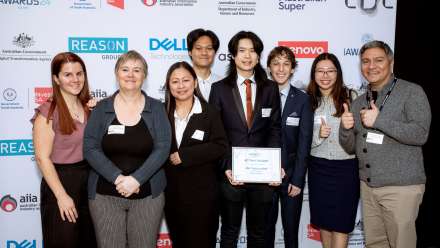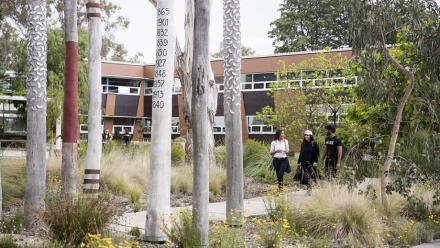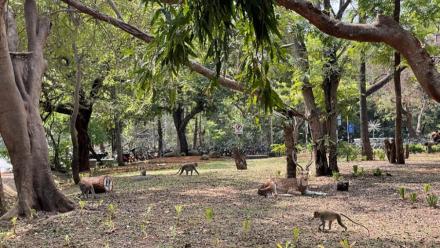VC's update – ACLF wrap up and Tech Policy Design Centre
Hello everyone
I am looking forward to our 'ANU Holiday' next week on Friday 17 September. A reminder for everyone to please switch off for the day and rest so we can all avoid the sense of dread that comes with a post-leave inbox! This also means no blog from me next week. Unfortunately, it looks like COVID is sticking around, so there will be restrictions. Can I suggest we get creative on how we spend the day. Our Deputy Vice-Chancellor Grady Venville has challenged her husband to a Scrabble championship - perhaps not everyone's cup of tea. Feel free to share your staycation with your colleagues or via social media.
When we return from the break, I will be teaching a class for the Physics for Future Leaders. I miss not getting to teach as much as I used to, but I still get a chance to do a few classes each year. In my class I will be teaching the students how to use the rocket equation to understand why getting into space is so expensive, and what the prospects for space mining are. In class we are going to nut out the best options and learn how to write a brief for a minister on the topic.
A recent highlight for me was attending the eighth ANU Crawford Leadership Forum (ACLF) earlier this week. Over the two days, ACLF brought together a whole range of interesting people from the University, Business, NGO, and Government sectors to talk about the major challenges our nation is facing, placed in the context of our region and the world. These discussions made lots of news, with the Australian treasurer making an important speech, and the Indian Minister of External Affairs Dr S Jaishankar delivering the JG Crawford Oration. But we also covered a huge range of topics from nuclear proliferation, global monetary policy, the near-term future of immigration policy, and the future of democracy to just name a few. I'd also like to thank ACLF Director Richard Maude and his team for their hard work in bringing it all together and transitioning it to online at the last minute. It was a truly excellent event - one of the best I have been to anywhere in the world. You can read Richard's op-ed about it here.
I am pleased to announce a new ANU initiative to establish a Tech Policy Design Centre on campus. We are heavily reliant as a society on the digital world, more so than ever after the abrupt shift to virtual living, working and studying, all over the world since COVID-19. Johanna Weaver will lead the Centre and brings a wealth of experience as a former lawyer and Australian diplomat who, most recently, was Australia's chief cyber negotiator at the United Nations. Johanna is already reaching out across the University, as getting this right requires input from almost every part of the University. Getting it wrong, well, pick your favourite sci-fi dystopia. That is why this is important.
I never want us to forget how amazing our students are here at ANU. Next week, a group of 40 of them will run the Australian Crisis Simulation Summit (ACSS), for its second year. It's a five-day event that simulates three intense and realistic crises. Over 250 applications from students all across Australia were received for the 70 places on offer. To help with it, they have enlisted a wide range of ANU academics and significant numbers of past and present Australian Leaders in the area who are household names. Well done to all our students involved and ACSS patron Admiral Chris Barrie.
We are working with ACT Health about how we can help get our community vaccinated as quickly as possible and we are also continuing to help inform Australia on how to get vaccinated, including Professor Nick Biddle's recent work. Nick's study has found there are some socio-economic predictors that are impacting the up-take of vaccinations - including people who do not speak English at home. The study found that those who speak a language other than English at home were significantly and substantially less likely to have been vaccinated than those who only speak English.
Interestingly, there was no significant difference in the likelihood of being vaccinated between Australian-born residents and those born overseas which suggests that the language someone speaks is a key factor in determining the likelihood of vaccination, not necessarily where they are born. Vaccination target rates are critical if we want to get out of lockdowns so it's important that ANU continues to play its role by ensuring people are informed on how to access vaccinations. You can read Professor Biddle's analysis here.
Finally, to our academics, let me point you to a recently advertised new position, Residences Academic Fellow. Our student residences strengthen our ability to provide a world class education, build belonging, create lifetime relationships that go beyond discipline and social circles, and stimulate a lifetime of engagement within our community. This key new role will help set the agenda to enrich and improve our on-campus experiences for our students in residences and the Fellow will get the opportunity to work closely with both the residential staff and students who provide academic support. If you are looking for a change and want the opportunity to make a huge difference for all our students, please put your hand up for this position.
The weather is looking better this weekend than last, and it looks like I will need to get the chainsaw out to cleanup a bunch of trees that came down in the rain and wind. I am also going to plant some potatoes and peas in the garden.
Brian


